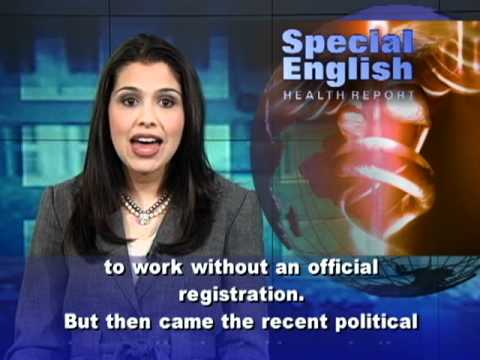This is the VOA Special English Health Reportfrom http://voaspecialenglish.com | http://facebook.com/voalearningenglish
In the past year,
Burma has opened its political system and reached cease-fire agreements with
some ethnic militias. The government has also eased media restrictions. But many
aid groups say their jobs have not gotten any easier.Health workers are warning
about the spread of a form of drug-resistant malaria. The malaria is resistant
to treatment with artemisinin. It was first seen several years ago in
Cambodia.Frank Smithuis started a group called Medical Action Myanmar. He says
even with the recent political openings, aid organizations still find it
difficult to gain access to areas most in need of aid. This is true, he says,
especially in areas torn by many years of conflict along Burma's eastern border.
He says there are now very good opportunities because of the cease-fire
agreements with the Karen and the Mon. Larger areas should now be open for
access to a joint activity to stop this artemisinin resistance spread. "However
that has not happened yet and we definitely need to have more openness and more
activity and more international donor money," he says. In the past, many
nongovernmental organizations simply worked without official approval.
Lower-level government officials largely ignored organizations that did not
follow the rules. Until two thousand nine, just three international
nongovernmental aid organizations had the required approvals to operate inside
Burma. Yet more than one hundred were operating there. Many were able to get a
memorandum of understanding that allowed them to work without an official
registration.But then came the recent political changes. Heads of aid
organizations say lower-level officials are now unclear about their powers and
responsibilities. In many cases they are enforcing the procedures more. Save the
Children is an aid organization whose work is mostly related to mother and child
health in Burma. Kelland Stevenson with Save the Children says, in general,
ministries and government workers have become much more cooperative. He agrees
with those who say the barriers that humanitarian workers now face are largely
bureaucratic. He says, "It shouldn't be a political discussion. There remains a
bit of command and control from government, and it's not going to open up
overnight." He says the discussion about getting access to new areas is under
way. In his words, "You have to remember these changes have been extraordinarily
dramatic in such a short time" -- a year. Kelland Stevenson says "things are
changing so quickly." Still, aid groups warn that some issues -- such as the
drug-resistant malaria -- may only get worse unless the government also takes
action quickly. For VOA Special English, I'm Alex Villarreal.For more health
news and other information for people learning English, go to
voaspecialenglish.com. (Adapted from a radio program broadcast 11Apr2012)
원문출처 : http://www.youtube.com/watch?v=EgF-IfLfux8&feature=youtube_gdata






 English
English 한국어
한국어
